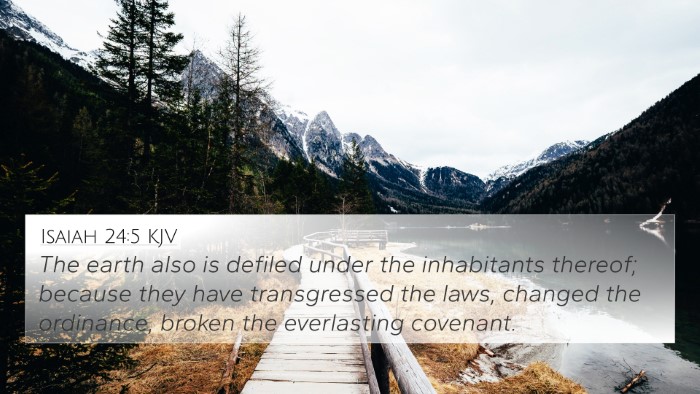Understanding Leviticus 26:35
Bible Verse: Leviticus 26:35
This verse states, "And as long as it lieth desolate, it shall rest; because it did not rest in your sabbaths, when ye dwelt upon it." In this scripture, God communicates the significance of the Sabbath and the consequences of neglecting it.
Contextual Background
Leviticus is a book outlining laws and rituals for the Israelites, focusing on holiness and the covenantal relationship between God and His people. Chapter 26 elaborates on the blessings for obedience and the consequences for disobedience, emphasizing the importance of adhering to God's commandments.
Interpretative Insights
Commentators provide various insights into the meaning of this verse:
-
Matthew Henry: Henry emphasizes that this verse illustrates God's justice. The land was to enjoy its sabbaths because the people did not grant it the rest it was due during their occupancy. This reflects God's holistic approach to the land and its rest.
-
Albert Barnes: Barnes highlights that the desolation of the land is not merely punishment but serves as a reminder of the covenant obligations. The neglect of these sabbaths has long-term consequences, drawing a parallel between spiritual negligence and physical desolation.
-
Adam Clarke: Clarke interprets this verse as a consequence of the people's unfaithfulness. The land lying desolate serves a dual purpose: as a punishment for Israel and a restoration opportunity for the land to rejuvenate until the people repent and return to their covenant with God.
Spiritual Themes
Several key themes emerge from Leviticus 26:35:
- The Sabbath Rest: The importance of observing the Sabbath is paramount, signifying rest not only for individuals but also for the earth.
- Consequences of Disobedience: Neglecting spiritual practices leads to dire results; in this case, the land's desolation.
- Covenantal Relationship: This verse illustrates the conditional aspects of God's covenant with His people—blessings following obedience and curses following disobedience.
Bible Cross-References
Several other scriptures relate thematically with Leviticus 26:35:
- Exodus 23:10-11: Discusses the need for the land to rest every seventh year, connecting the concept of Sabbath rest for the land with God's commandments.
- Deuteronomy 15:1-2: The year of release also emphasizes God's interest in fairness and rest throughout the Israelite community.
- 2 Chronicles 36:21: This verse narrates how the land experienced its sabbaths during the Israelites' exile, highlighting the fulfillment of God's proclamation of rest.
- Jeremiah 25:11: Proclaims the desolation of the land and its connection with Israel's disobedience to God's laws.
- Ezekiel 36:34-35: Indicates the restoration of the land after desolation and the significance of God's covenant with the people.
- Hebrews 4:9-10: Connects the Old Testament concept of Sabbath rest with a spiritual reality for believers, emphasizing a fuller understanding of rest in Christ.
- Matthew 12:8: Jesus asserts His Lordship over the Sabbath, broadening the understanding of rest and its true purpose in relation to God’s commands.
Conclusion
Leviticus 26:35 serves as a profound reminder of the importance of resting in God's commandments and recognizing the broader implications of spiritual neglect. From the insights offered by commentators and the thematic connections to other scriptures, we uncover a deeper understanding of God's expectations and the blessings connected to His covenant.
Why Cross References Matter
Utilizing cross-references when studying the Bible allows for a richer understanding of scripture. It helps identify connections between Bible verses and promotes a comparative analysis, revealing the unity and depth within the Biblical text.
Resources for Cross-Referencing
For those looking to engage deeper with Biblical texts, consider the following tools and methods:
- Bible concordances and cross-reference guides
- Cross-reference systems in study Bibles
- Bible chain reference methods for thematic studies




